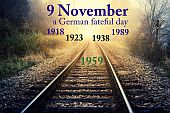Remembrance of 9th November 1959, the birth of our Jumelage movement, and thoughts beyond
 9th November 1959 is a memorable date for Jumeleurs. On this day, a French post office official reached out to his German colleagues for reconciliation and to get to know each other better. 41 years after the end of the First World War and 14 years after the end of the Second World War, prejudices, misunderstandings and even hatred still clouded relations between French and Germans.
9th November 1959 is a memorable date for Jumeleurs. On this day, a French post office official reached out to his German colleagues for reconciliation and to get to know each other better. 41 years after the end of the First World War and 14 years after the end of the Second World War, prejudices, misunderstandings and even hatred still clouded relations between French and Germans.
He did so that day by means of a letter in which he suggested, among other things: „...ensemble, fonder un mouvement tout simplement pétri de chaleur humaine.“ (...together, found a movement, quite simple, shaped by human warmth).
This letter, written by Alexandre Chappé, Directeur Départemental des PTT de l'Aube in Troyes, addressed to Fernmeldetechnisches Zentralamt in Darmstadt, and forwarded by the latter to Posttechnisches Zentralamt, fell into the hands of the staff counsel Hans Winkel, who enthusiastically took up the idea. First meetings of small groups followed, marked by uncertainty and tension on both sides – „how will they welcome us?“ - soon followed by the establishment of a "postal partnership" between Troyes and Darmstadt. Thus, on 25th June 1962, Darmstadt became the home base of the registered association „Jumelage Postal“. Due to the formation of further sections in Germany and the foundation of national federations in Great Britain, Italy and Portugal, it was necessary to unite all federations in one umbrella organization. On 25th April 1984, the Union Internationale des Jumelages PTT (UIJPTT) was established in Paris. Spain, Ireland, Belgium and Switzerland joined the UIJPTT. After the "Iron Curtain" fell, contacts with Poland, Russia, Romania and Hungary soon followed.
Alexandre Chappé (1912-1995) and Hans Winkel (1913-2012) have gone down in the annals of history as the founding fathers of "Eurojumelages" that now exists throughout Europe. In the following years, the activities of the associations were gradually expanded beyond the regular meetings. Language courses were organized, sporting activities were introduced (Oscar, boules tournaments, hiking weeks), national and international meeting weeks were held in holiday villages and national and international congresses were organized. The association also opened up to "non-postal workers".
At the beginning of 2022, from circa 60 associations in Germany, the number temporarily shrank to 32, with about 2,400 members. In 2017, the number of members in the 13 affiliated European countries was around 11,000. Their wish for peace and European integration is still their desire.
9th November should be a day of reflection on our country. In recent German history there are a number of "fateful days" that fall on 9th November. They look back on absolute lows but also on great moments: The proclamation of the republic in Berlin after the November Revolution on 9th November 1918. Hitler’s putsch in Munich on 9th November 1923, which ended bloodily in front of the Feldherrnhalle. The pogroms against German Jews ordered by Goebbels in Munich's Old Town Hall on 9th November 1938, which led to the Holocaust. The failed bomb attack by the Swabian carpenter Georg Elser on Hitler in the Munich Bürgerbräukeller on the eve of 9th November 1939, and finally the fall of the Berlin Wall on 9th November 1989 after a preceding more or less peaceful revolution.
Actually, this day, 9th November, should be considered the national day of the Germans, instead of 3rd October, which a year later only resulted from an administrative compromise. And yet, all these events in Germany have a dramatic historical context. And thanks to Alexandre Chappé and Hans Winkel, we Jumeleurs can add 9th November 1959 as the founding day of our Jumelage movement to the list of great moments.
Gustav Dittrich
Association of München
Germany


